Lingones
Q931808Lingones: tribe in ancient Gaul, living in the modern French département Haute-Marne.
A Celtic tribe
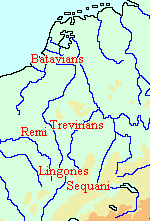
In the famous introduction to his Gallic War, the Roman commander Julius Caesar distinguishes three kinds of people living in the war zone: the Aquitanians in the southwest, the Belgians in the north, and those "we call Gauls but are in their own language called Celts". There has been a lot of debate about the question who these Celts were, but today, most scholars will agree that we can call those people Celts who (a) spoke Gallic and (b) belonged to what archaeologists call the "La Tène culture". In this sense, the Lingones were an ancient Celtic tribe.
Their capital Andematunnum ("fortress of the great bear"?) can with some justification be called the economic center of preindustrial western Europe. It was built on a rocky promontory above the headwaters of the river Marne, which connects the town with the Atlantic Ocean; but it is also situated on the great economic axis of Europe, the corridor from the Mediterranean to the North Sea that consists of the rivers Rhône, Saône, Moselle, and Rhine. Whoever wanted to travel from the Saône to the Moselle had to cross the watershed at Andematunnum (modern Langres).
The Lingones make their first appearance in history in c.400 BCE, when they joined the Gallic conquest of the plains of the Po. Its exact cause is not really understood, but it is clear that between 440 and 380, there were social changes in the area between the rivers Marne and Upper Elbe, and the old aristocracy appears to have been replaced by a new warrior elite. There must have been social tensions, and mass migration appears to have been one of the solutions. The area along the Marne saw a rapid decline of population, and many of its former inhabitants seem to have crossed the Alps.
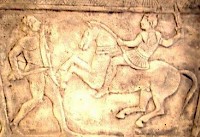
Members of the tribes of the Senonians and Lingones settled on the eastern Po plain, close to the Adriatic sea. First, they attacked the native Etruscans; then a band of warriors sacked Rome (in 387/386 BCE; more...); and finally, they settled south of the Po, along the shore of the Adriatic Sea. The area became known as the Ager Gallicus and even when it had been conquered by the Romans, it was still remembered as a frontier zone. The river Rubico was regarded as the boundary between Italy and the Gallic territories south of the Alps (Gallia Cisalpina).
Caesar's allies
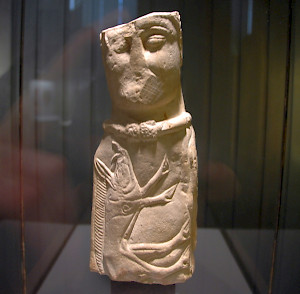
Meanwhile, there were still Lingones living in the homeland. Its natural position made Andematunnum an important economic center and gave the Lingones considerable influence in ancient Gaul. It comes as no surprise that they played a role of some importance during the Roman conquest of modern France. In 58 BCE, Julius Caesar defeated a tribe of wandering Helvetians who threatened Rome's allies, the Aeduans; later, the Roman general moved to the valley of the Middle Rhine, where he attacked the Germanic warlord Ariovistus, who was also threatening the Gallic tribes. The Roman advance was possible because the Lingones had offered grain supplies. This comes as no surprise. The inhabitants of Andematunnum benefited from the trade route that connected the Mediterranean with the far west and north: they were Rome's natural allies.
So far, Caesar's actions had been more or less defensive: he had supported old allies and had received support of new allies. In the next year, however, he decided to invade Belgica, the northern part of Gaul. The Belgians knew what was about to happen and concluded an alliance, but before they were ready, Caesar was already there and prevented the tribe of the Remi to join the alliance. He can only have done so with help of the Lingones.
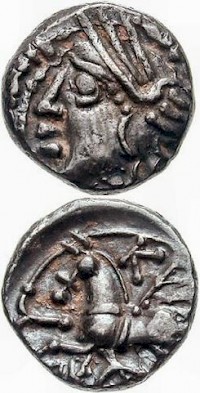
From now on, the Lingones, Aeduans, and Remi were Caesar's most loyal supporters. When the Romans were in trouble after the insurrection of Ambiorix (in the winter of 54/53), two legions could recuperate in the Andematunnum area. And when Caesar besieged Alesia in 52, the Lingones were among his allies, probably helping him with cavalry. Lingonian horsemen were certainly present during the campaign against the Bellovaci in 51. Yet, the most important contribution of the Lingones must have been economical: from a supply base at Andematunnum, the Romans could strike in any direction.
After the conquest of Gaul, Julius Caesar fought a civil war against general Pompey and the Senate, and became sole ruler of the Mediterranean empire. We know that several Germanic and Gallic cavalry units took part in his campaigns, and it is possible that Lingonian horsemen followed Caesar to Catalonia, Greece, Egypt, Pontus, Africa, and Andalusia. When they returned home, they had received the Roman citizenship, and showed the other Lingones which benefits they could expect from cooperation with the Romans. We know that later, the Lingonian contribution to the Roman army amounted to four regular auxiliary units.
After the murder of Caesar, the Romans experienced a civil war between his assassins Brutus and Cassius and Caesar's followers Mark Antony and Octavian. When the Caesarians had been victorious and could think about the government of the empire again, they sent Marcus Vipsanius Agrippa as governor to Gaul. In 39-38, he laid the foundations of Roman rule north of the Alps.
This included the construction of new roads. The most important street connected the Gallic capital Lugdunum (modern Lyon) with Andematunnum, where it divided into two branches: one to the northwest, to the capital of the Remi, Durocortorum (Reims), and the Channel, and one to the north, to Trier and the capital of the frontier zone along the Rhine, Cologne. The presence of Italian wine amphoras in towns along the new roads suggests that merchants followed in the footsteps of the soldiers, and proves that Andematunnum had not lost its economic significance.
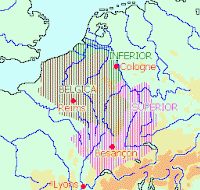
This is also indicated by the boundaries of the frontier zone along the Rhine, which was occupied by the armies of Germania Inferior and Germania Superior. The Lingones were included in the second of these zones and must have produced food for the legions of Mainz. In Agrippa's geographical description of Gaul, which has come down to us in Pliny the Elder's Natural history the Lingones are mentioned as foederati (allies).note In other words, the Roman government officially considered the Lingones as an independent nation; in the course of time this became a dead letter, but when Pliny published his Natural history (in 77), it was still something to be proud of.
The loyalty of the Lingones to the Roman government was beyond dispute. In 21, the Aeduans and Treveri revolted, and several other communities sided with them, but the Lingones, who lived between the two main rebel groups, are not mentioned among those who were unquiet.
Hard times
In the 60s the country north of the Alps had become romanized. However, during the days of the emperor Nero, it appeared that Rome itself was losing its "romanism", and one of the governors of Gaul, Gaius Julius Vindex, decided to revolt (January 68). As he was a Gaul himself, the Roman authorities feared that he was the leader of a nationalist rising, but in fact, he and his ally Servius Sulpicius Galba wanted to restore the old Roman virtue. However, Vindex's levies were no match for the army of Germania Superior (the legions XXI Rapax, IIII Macedonica and XXII Primigenia), which was commanded by Lucius Verginius Rufus and had been supported by the reliable Gallic communities like the Lingones.
For a moment, tranquillity returned. But Galba had not yet been defeated, and in Rome, Nero lost control of the situation. The Senate declared that he was an enemy of the state, the emperor committed suicide (8 June 68), and Galba was recognized as ruler of the Roman world. The legionaries and Lingones who had supported the Roman government by suppressing the revolt of Vindex, now discovered that their loyalty was explained as an attempt to prevent Galba's accession. The soldiers became restless and argued that their commander was to assume the imperial purple, but Verginius Rufus refused. Galba replaced him by Marcus Hordeonius Flaccus, which was interpreted by the troops as a sign of distrust. On 2 January 69, they revolted and accepted the governor of Germania Inferior as their emperor: Aulus Vitellius.
The Lingones sided with the rebellious legions. Not only because they were in the neighborhood or because they had already fought together against Vindex, but also because Galba had announced a measure against the Lingones, perhaps involving loss of territory.note The onerous presence of the recently created First Legion Italica must have contributed to the Lingonian choice as well.
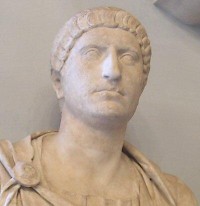
When the Vitellian insurrection became known in Rome, Galba panicked and announced the appointment of a successor. The only result was that the imperial guard also revolted, killed Galba, and put Marcus Salvius Otho on the throne (15 January). Among his earliest measures was to award Roman citizenship to all Lingones, hoping that they would abandon their alliance with Vitellius. It was too late. Probably, one of Vitellius' two armies (subunits of I Germanica, V Alaudae, XV Primigenia, and XVI Gallica, commanded by Fabius Valens), had already passed through Andematunnum. Our sources mention that eight Batavian auxiliary units had a rendez-vous with the Vitellian legions in the country of the Lingones. On 16 April, the Vitellians defeated the army of Otho near Cremona; the defeated emperor committed suicide and the Senate hastily sent congratulations to Vitellius.
Vitellius arrived in Rome on 17 July, only to learn that in Judaea, general Vespasian of the expeditionary force that had been sent against the rebellious Jews, had been proclaimed emperor too. Almost immediately, the Batavians, a valiant tribe living in the lower Rhineland, revolted. They had several reasons for their rebellion, but it is likely that the powder barrel was set off by Vespasian, who promised their leader Julius Civilis some sort of independence; the two men had met each other during the war in Britain.
The Batavian revolt was a very serious affair, because it took place in Vitellius' own power base, which he was unable to protect as long as he needed his troops in the civil war against Vespasian. In September 69, the Batavians defeated the soldiers of V Alaudae and XV Primigenia who had been left behind, and proceeded to lay siege to Xanten. The eight Batavian auxiliary units joined their compatriots, and although the Roman commanders, Marcus Hordeonius Flaccus and Gaius Dillius Vocula, did their best to maintain order in the Rhineland, they were unable to prevent the fall of Xanten and Cologne. Meanwhile, the most important temple in the Roman world, the Capitol, had been destroyed during a fight between supporters of Vitellius and Vespasian. And after Vitellius had been defeated by Vespasian, there were (incorrect) rumors that his son Titus had revolted.
It must have seemed as if the Roman empire was doomed, and it is at this point that a Lingonian named Julius Sabinus proclaimed himself emperor. His rebellion has to be distinguished from the Batavian revolt. The latter had retained their tribal character, but the Lingones and their allies were fully romanized and wanted to start an empire of their own. Their rebellion was a sign that they felt self-confident in their Roman way of life: if the real empire fell, they would start an empire for themselves, continuing the traditions and culture they had embraced. Sabinus became its leader, the fifth emperor in thirteen months.
The first success came in January 70, when two Roman legions, I Germanica and XVI Gallica, were defeated by the Batavians and surrendered to the Gallic empire. The former adherents of Vitellius must have found it easy to break their oath to Vespasian and swore allegiance to Sabinus. Julius Sabinus directed them to the capital of the new empire, Trier, and hence to Metz, where they were far away from the war between the Romans and Batavians.
Sabinus' next step was an attack on the Sequani, who lived in the valley of the river Doubs. From here, the soldiers of the Gallic empire could proceed to the Rhine and cut off all support for the remaining Roman troops. However, the Sequani remained loyal and were able to overcome the Lingonian attack. Because at the same time, the Romans were slowly recovering from the civil war, the Gallic communities organized a conference in the country of the Remi, where it was decided that they would support the new emperor of Rome against the Batavian rebels. The Lingones and Treveri were invited to lay down their weapons.
The Roman general in charge of the suppression of the Batavian Revolt was Quintus Petillius Cerialis. A second army, consisting of I Adiutrix, VIII Augusta, and XI Claudia, was officially commanded the new emperor's son Domitian (in fact by Appius Annius Gallus) and overcame the Lingonian revolt. It seems that the citizens of Andematunnum feared that the town would be plundered by the approaching troops, but their commander Sextus Julius Frontinus left them unharmed, made sure that no one lost his property, and obtained the gratitude of the Lingones, who surrendered the remaining rebels to him. According to Frontinus himself, there were 70,000 of them, but this must be exaggerated.note
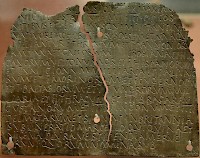
Lingones remained unpunished. Vespasian ordered the execution of Julius Sabinus and decided that the Lingonian auxiliary units had to be sent to Britain. At least four units of 500 men are mentioned on inscriptions:
- Cohors primae Lingonum equitata: an equestrian unit based in Bremenium (High Rochester in Northumberland) and Longovicium (Lanchester in Durham). The emperor Gordian III (238-244) awarded this unit the title Gordiana.
- Cohors secundae Lingonum: stationed at Gabrosentum (Moresby, Cumbria), where they must have acted as some kind of coast guard during the reign of Hadrian. Later, they were transferred to Ilkley in Yorkshire.
- Cohors tertiae Lingonum: no known fort.
- Cohors quartae Lingonum: This unit was transferred to Britain in 71 and took part in the northern campaign conducted by Quintus Petillius Cerialis. By the end of the fourth century, it occupied Segedunum, the easternmost fort of Hadrian's wall, also known as Wallsend.
It is likely that after the reign of the emperor Hadrian, these units were increasingly recruited from Britain itself.
A Roman town
By now, the Lingones were considered to be real Romans. Otho had given them citizenship, and although their loyalty had for a while been suspect, they and the other communities of Germania Superior were accepted as civilized people. By the end of the first century, the emperor Domitian, who had succeeded his father, converted the military zone of Germania Superior into a normal province.
For various reasons, we have less sources for the second century and the Lingones disappear from history. Their story is more or less identical with that of Gaul as a whole. Andematunnum continued to prosper and remained well-integrated into the Roman economy, something that is corriborated by a great many dedications to oriental gods that were discovered on the south-eastern cemetery of the Lingonian capital. Although there had been important towns in the country of the Lingones, Andematunnum superseded them and became known as the city of the Lingones. In the third century, its old Celtic name was forgotten and the town was simply called Lingones. The modern name Langres is derived from the name of the ancient tribe. (This was a common development in Roman Gaul, cf. Parisi > Paris, Senones > Sens and Treviri > Trier.)
Because of its important economic role, Langres was a natural target for Germanic tribes, who invaded the area after the mid-third century. In 298, the city was sacked by the Alamans, but the Roman government was able to restore order. The fourth century marks the last flowering of Gallo-Roman culture, and the Lingones, still part of the Mediterranean world, gradually converted to Christianity.
The end came at the beginning of the fifth century. In 405, one of the Germanic tribes crossed the Danube and attacked Italy. The emperor Honorius and the supreme commander of the Roman forces in Europe, Stilicho, transferred the armies of Gaul to northern Italy. They knew that other tribes would cross the Rhine, but Stilicho reckoned that he could deal with them later. However, the Germanic pressure could no longer be resisted. In the winter of 406/407, the Suebians, Quadi, Vandals, and Burgundians crossed the Rhine, and without opposition, they continued to Hispania.
Although bishop Desiderius tried to defend Langres, the city was captured and sacked in 411. The martyrdom of Saint Didier, as he is called today, is remembered every year on 23 May. What was left of the city of the Lingones was destroyed in 451, when the Huns of Atilla invaded Gaul.